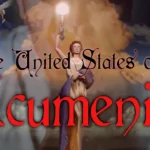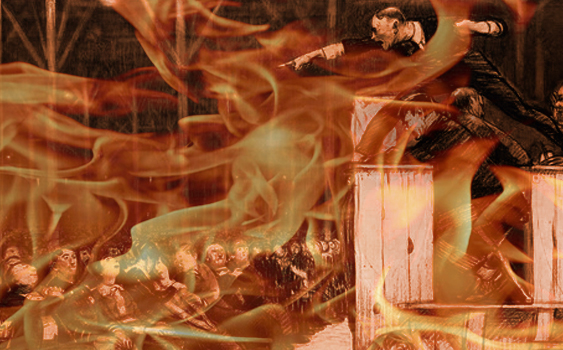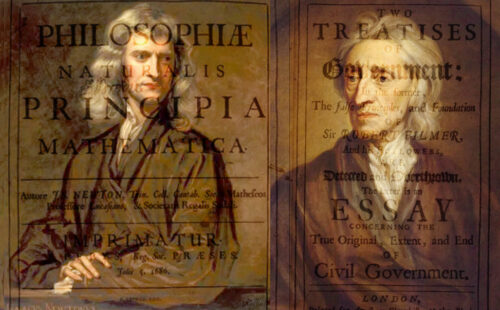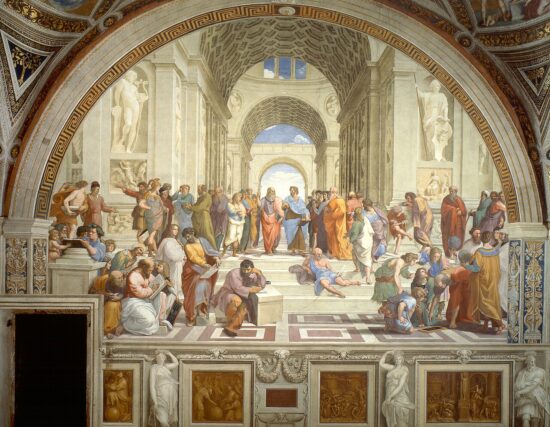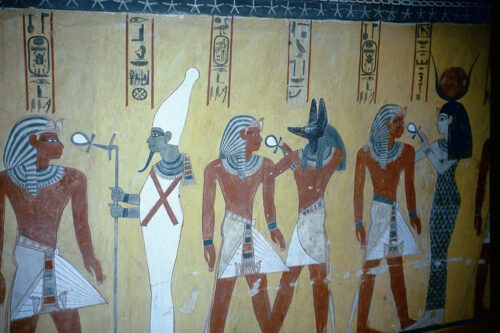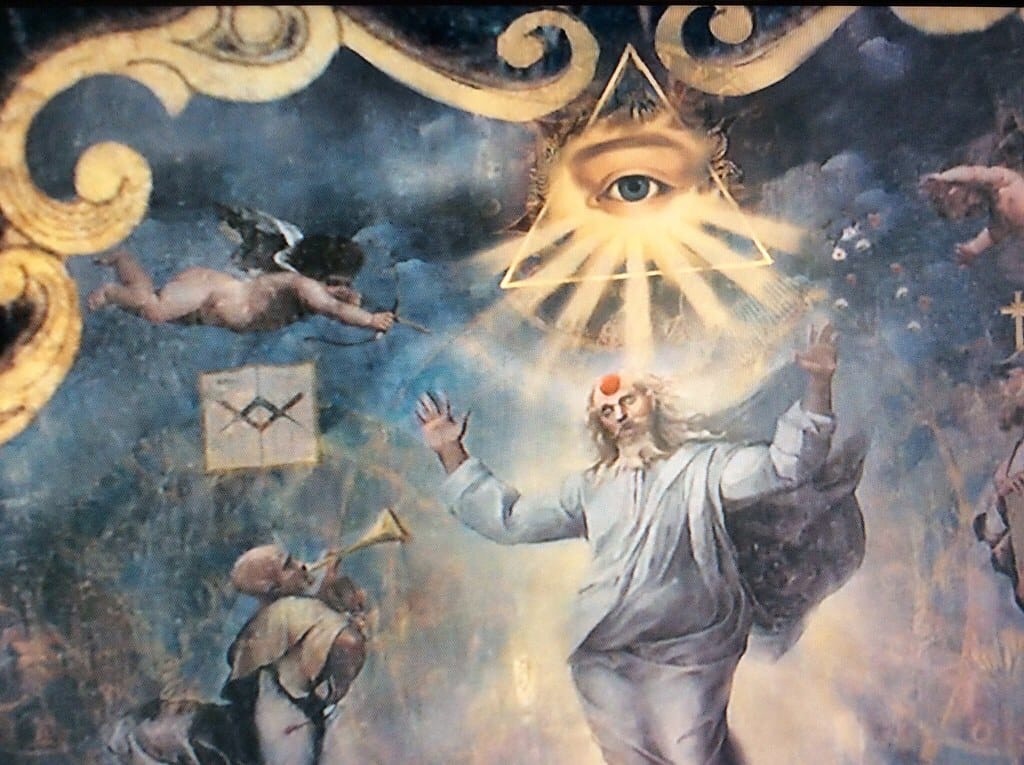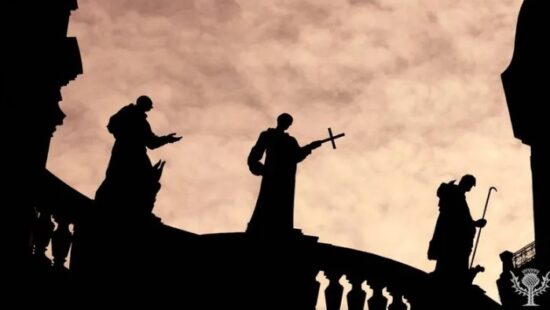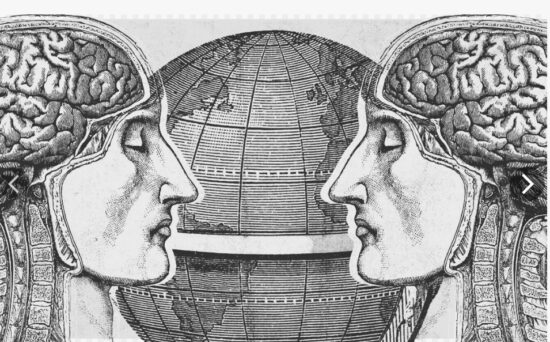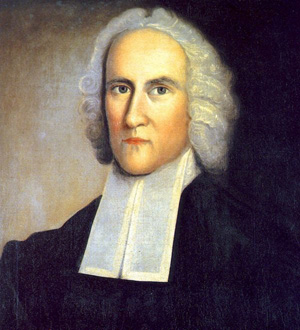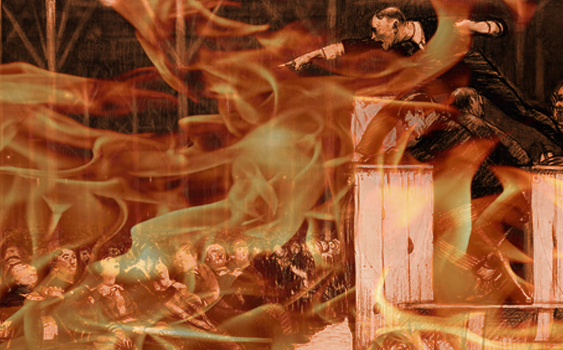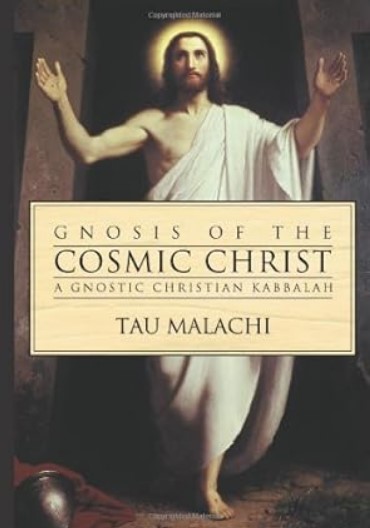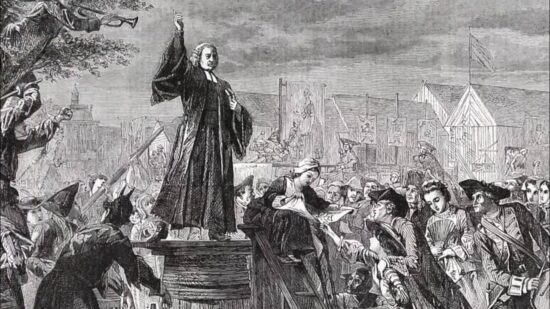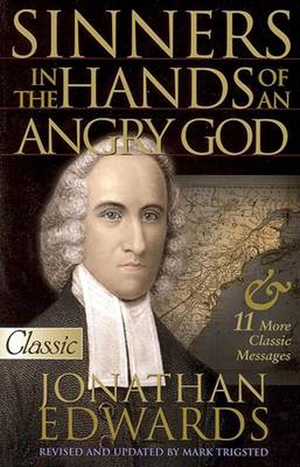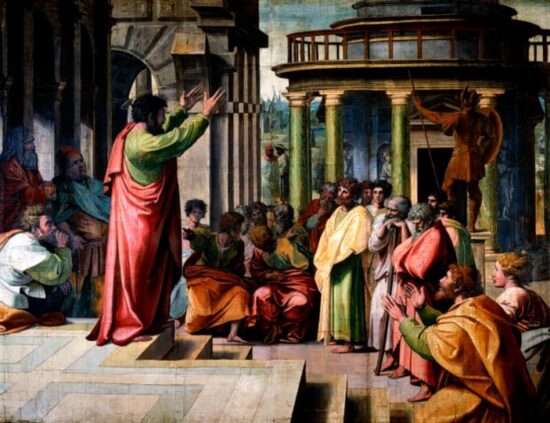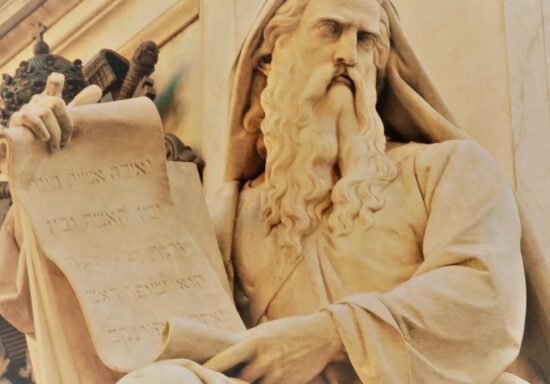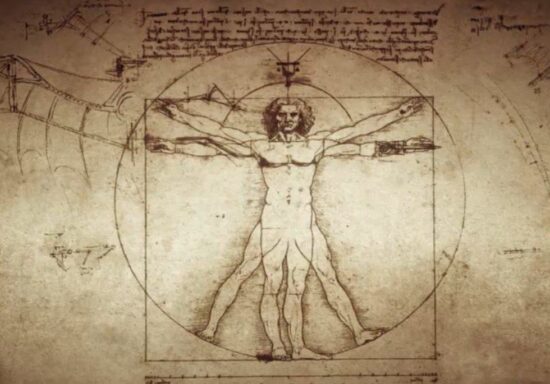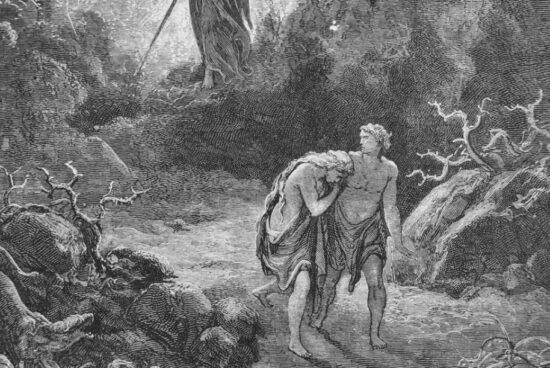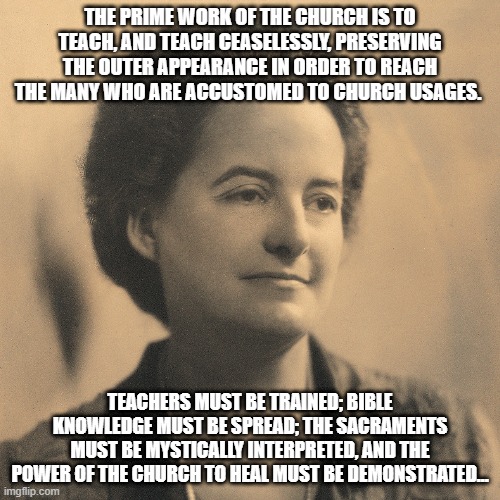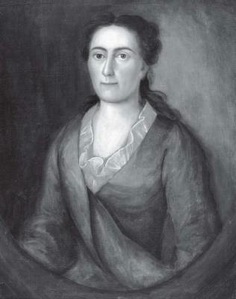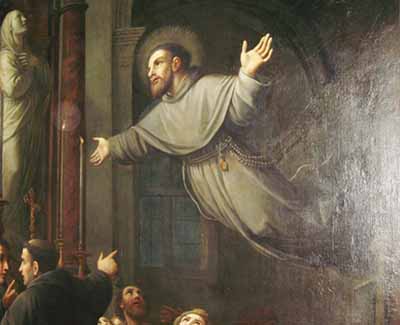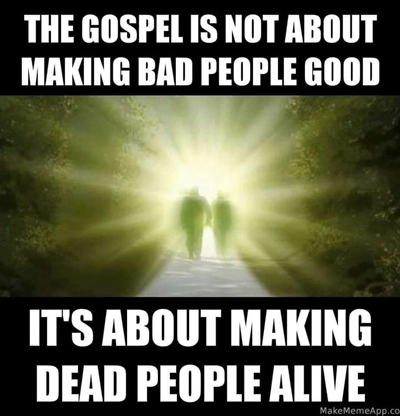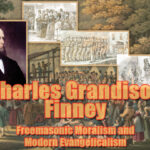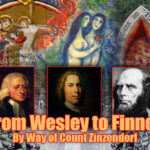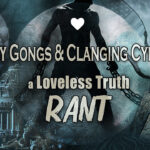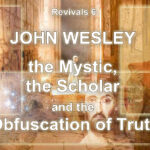Revised from 4/7/2023

“It is my earnest conviction that we have dreadfully complicated what Christianity is all about. I’m not saying supplemental materials are without value… But I do wonder what complex, interlocking, systematic theologies were bouncing around in Peter’s mind on the Day of Pentecost and in those fresh, exciting years that followed. Were the epistles only meaningful after the theologians had opportunity to tear them apart and glue them back together?”
– David Needham, Birthright; Christian, Do You Know Who you Are?
Indeed…
Most people are aware that Enlightenment thought originates in Greek philosophy. But it’s less well known that the Greek philosophers were students of the Mystery Schools.
Enlightenment Thought is Mystery School thought—An Enlightened Worldview is a Mystery School Worldview.
And whether they’re Reformed Intellectuals or Charismatics, even Christians have embraced this perceived reality. Captured by Enlightenment Reasoning and Mystical pursuits—they’ve placed rationalism over faith and run after signs, mysteries, and human saviors. As a result, calling for discernment isn’t popular nor interesting enough to scratch their itching ears.
For the time is coming when people will not endure sound teaching, but having itching ears they will accumulate for themselves teachers to suit their own passions, (2 Tim 4:3)
But for those who are interested, we’ll be looking at how Enlightened/Mystery School thought has contributed to the “complex, interlocking, systematic theologies” Needham mentions, and one Revivalist in particular who is famed for introducing Enlightenment Thought to American Protestantism.
THE AGE OF ENLIGHTENMENT
The Age of Enlightenment emerged alongside the Reformation. Mankind was finally able to read God’s Word for himself, but its powerful truth was insidiously twisted to blend it with Enlightenment thought along with the Papal teachings and practices of the Counter-Reformation. And America’s Great Awakenings served to firmly embed these conflations within American Christianity, diluting the Gospel of Grace with a carnal worldview.
What is Enlightenment Thought?
Enlightenment Rationalists of the 18th century believed the world could be explained through Human Reason. Enlightenment philosophers rejected traditional (church) authority and “superstition” (faith), maintaining that reason was the primary source of all knowledge and could be used to understand and shape all aspects of life.
OK, here’s where they get you with this stuff. This is not simply using reason and logic to make good decisions, solve problems, and understand the world around us. It is a BELIEF SYSTEM that’s diametrically opposed to God’s Word. It’s Secular Humanism, which maintains that man’s reason alone can:
Critique Religion, including God’s Word
Establish Moral Principles Apart From God’s Word
Achieve the Perfect Society Governed by Man through Social Reform; which was a key thrust of the Revivalists
Our basic, God-given reason gives us the ability to think clearly and logically without a Philosophical/ Mystical Agenda. God says, “Come let us reason together…” (Isa 1:18) but He condemns Philosophy;
Take heed lest there will be anyone taking you captive through philosophy and empty deceit, according to the tradition of men, according to the principles of the world and not according to Christ. (Col 2:8)
The Enlightenment Rationalists largely held to Universalism* (Mystery School/Hermeticism “Oneness” that makes no distinction between God and His creation*), along with Progress and the Improvement (Ascension) of mankind through KNOWLEDGE.
*UNIVERSALISM is essentially Hermetic Oneism for modern times. Many Revivalists adopted some elements of Universalist thinking, softening the Gospel by emphasizing Mystical Experience over sound doctrine. This is where modern Christianity got ideas like:
“God wouldn’t send anyone to hell.”
“Jesus is love, so everyone will eventually be saved.”
“All religions contain some truth.”
It’s unscriptural Esoteric thought that subtly denies the Gospel while sounding “loving” and “inclusive.”
ENLIGHTENMENT THOUGHT is just a repackaging of the original lie in the garden:
For God doth know that in the day ye eat thereof, then your eyes shall be opened, and ye shall be as gods, knowing good and evil. (Gen 3:5).
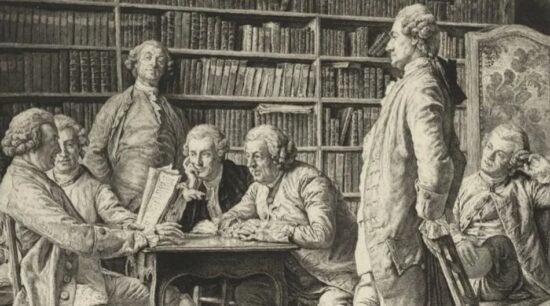
The Revivalists infused the Enlightenment’s Social Reform into Christianity, preaching Moral Improvement, Social Activism, and National Transformation rather than faith in Christ alone. We see this today with Evangelicals believing that ‘fixing America’ or ‘restoring Christian values’ are the same as advancing God’s kingdom. But that’s not the Gospel—it’s repackaged Humanism; man’s desire to replace God’s authority with his own; the deification of man.
OK, with that background, let’s get to today’s Revivalist who’s championed for blending Enlightenment thought into Christianity.
THE ENLIGHTENED JONATHAN EDWARDS (1703 –1758)
 A contemporary of George Whitefield, Jonathan Edwards is known as the “Father of the First Great Awakening.” Although he might also aptly be called the “Father of Fire-and-Brimstone,” but we’ll get to that.
A contemporary of George Whitefield, Jonathan Edwards is known as the “Father of the First Great Awakening.” Although he might also aptly be called the “Father of Fire-and-Brimstone,” but we’ll get to that.
Proficient in Latin and Hebrew, Edwards is hailed as a “scholar among scholars,” and regarded as one of America’s greatest and the original Philosophical Theologians. Edwards was greatly influenced by Cambridge Platonism and Enlightenment thinkers John Locke and Isaac Newton. Cambridge Platonists were an influential group of Philosophers and Christian Theologians who were engaged with Christian Kabbalah.
“The Platonic-Cabbalism… of the Cambridge Platonists is essential to the intellectual and spiritual vision of their Christian Platonism.” – Cambridge Platonism
Christian Platonic-Cabbalism (Kabbalism)?
“The noble idea of the Christian Kabbalah is not so much the worship of Jesus Christ, but rather a conscious evolution toward a divine or super-humanity. In this regard, Christian Kabbalah is quite different from its Jewish roots, and Gnostic Christianity is very different from orthodox Christianity. Both are about experiencing God and evolving toward God, rather than just studying theology.” – Gnosis of the Cosmic Christ, Description
Although, as a staunch Calvinist, Edwards rejected Universalism, he boldly integrated Philosophical Rationalism into his teaching. But the New Testament offers no such friendship.
Has not God made foolish the wisdom of the world? For since, in the wisdom of God, the world did not know God through wisdom, it pleased God through the folly of what we preach to save those who believe. For Jews demand signs and Greeks seek wisdom, but we preach Christ crucified, a stumbling block to Jews and folly to Gentiles… For the foolishness of God is wiser than men, and the weakness of God is stronger than men. (1 Cor 1:21-25)
Orthodox ministers condemned Edwards’ work, but fellow Revivalists John Wesley and George Whitefield looked to him for inspiration.
Reviewing the book, Jonathan Edwards, An Introduction to His Thought, Written by Oliver D. Crisp and Kyle C. Strobel, The Gospel Coalition writes,
“[R]eading Edwards correctly requires finessing his thought in light of his retrieval of an eclectic mix of Natural Philosophy and Theology across history and located within his Enlightenment context.” – thegospelcoalition.org
Edward’s Enlightenment influences led him to interpret Scripture through a PHILISOPHICAL LENS; which is the core of a Systematic Theology—as opposed to the simple reading of Scripture. That lens being forged with Metaphysical Idealism, Occasionalism, and Pantheism.
“Often these views are not reported in popular accounts of [Edwards’] work, though they are widely known in the scholarly community.” – Cambridge.org/The Orthodoxy of Jonathan Edwards
Basically:
…For what partnership has righteousness with lawlessness? Or what fellowship has light with darkness? (2 Cor 6:14)
Edwards led a movement known as the “New Light” which held that true faith was based on the heart and reason, and was evidenced by personal spiritual experience. These guys were so assured of their spiritual “enlightenment” that many of them questioned the salvation of other ministers.
“The revivals had caused a split between supporters and opponents, known, respectively, as New Lights and Old Lights… itinerant New Light preachers declared that other ministers were unconverted and therefore not worthy of their office.” – ConnecticutHistory.org
Essayist Marilynne Robinson noted in her 2014 journal article “Jonathan Edwards in a New Light: Remembered for Preaching,”
“Never departing from strict reason[!], Edwards sanctified the unknowable… Edwards intended from his earliest work to create an all-unifying METAPHYSICS and, though he did not achieve this, his thought feels shaped by the intention to keep the possibility implicit. It accommodates LOCKE and NEWTON, the best philosophy and science of his period. His thought asserted a great influence on the intellectual/activist movement that [would arise] out of the Second Great Awakening that created many educational institutions across the country.” – NEH
Enlightenment ideas are prevalent in Universities and Christian Seminaries today, so Christian scholars largely take no issue with Edwards ideas. But critical views of him do exist. I found one from church “intelligentsia” in this article on Heidelberg blog.

Five-star Calvinists have their issues, but they aren’t wrong to reject Edwards’ Enlightenment-driven evangelicalism.
“[The] modern Evangelical movement [has] roots in Pietism, which, in brief, was a reaction to the European and British state-churches. The Pietists feared what they (and their theological offspring) called “dead orthodoxy,” i.e., a mere confession of an orthodox faith without sufficient evidence of what people today call “lived experience…”
[T]he later Pietists abandoned [orthodoxy] in favor of Religious Liberalism—and they sought perceptible evidence (e.g., religious and social activism) of new life and they set up tests[!] to measure, if you will, the temperature of one’s religious experience. [🤨]…
One simply finds no such thing in Scripture…” – R. Scott Clark
Edwards’ Enlightenment worldview is betrayed in his infamous sermon “Sinners in the Hands of an Angry God.” As a “Systematic Theologian,” he attempts to psychologically persuade men to trust in Christ through fear of a bloodthirsty God sending them to hell.
“The bow of God’s wrath is bent, and the arrow made ready on the string, and justice bends the arrow at your heart, and strains the bow, and it is nothing but the mere pleasure of God, and that of an angry God, without any promise or obligation at all, that keeps the arrow one moment from being made drunk with your blood… 😳
O sinner! Consider the fearful danger you are in: it is a great furnace of wrath, a wide and bottomless pit, full of the fire of wrath, that you are held over in the hand of that God, whose wrath is provoked and incensed as much against you, as against many of the damned in hell.” – Jonathan Edwards, Sinners In The Hands Of An Angry God
Ya, I know.
In fairness, Edwards sermon had some things right.
“There is this clear evidence that men’s own wisdom is no security to them from death… ‘How dieth the wise man? even as the fool.’ (Eccl. 2:16.)” – ibid
But this, now familiar, dramatic and emotional approach is trademark of the Revivalists who often used fear to motivate repentance and piety. But we don’t find this in the Epistles.
The Apostles warned of God’s impending judgment. But their message was Grace and Hope in Christ for salvation (Rom 5:1, Rom 8:1) and that the power to live out their New Spiritual Life in this world came through the Holy Spirit (Rom 12:1-2). Not Philosophy. Not Reason.
Now, God was indeed angry with fallen man’s rebellion in the Old Testament. In Romans 3, Paul quotes Psalm 53, which sounds a bit like Edward’s sermon.
None is righteous, no, not one;
no one understands;
no one seeks for God.
All have turned aside; together they have become worthless;
no one does good,
not even one.
Their throat is an open grave;
they use their tongues to deceive.
The venom of asps is under their lips.
Their mouth is full of curses and bitterness.
Their feet are swift to shed blood;
in their paths are ruin and misery,
and the way of peace they have not known.
There is no fear of God before their eyes…
But Paul goes on to tell of God’s great Mercy.
…for all have sinned and fall short of the glory of God, and are justified by his grace as a gift, through the redemption that is in Christ Jesus, whom God put forward as a propitiation by his blood, to be received by faith. . (Rom 3:22-24 ESV)
Jesus spoke of God’s coming judgment (Matt 12:37), but also His great Love for us and our Value to Him.
Are not two sparrows sold for a penny? Yet not one of them will fall to the ground outside your Father’s care. And even the very hairs of your head are all numbered. So don’t be afraid; you are worth more than many sparrows. (Matt 10:29-31)
Fear not, little flock, for it is your Father’s good pleasure to give you the kingdom. (Lk 12:32)
Conviction of sin come through His Holy Spirit, not psychological shaming.
And when he comes, he will convict the world concerning sin and righteousness and judgment: (Jn 16:8)
The trend in modern Christianity to downplay sin and hell is a dialectic reaction against this unscriptural “fire and brimstone” preaching.
As a Calvinist, Edwards held that salvation came from the Grace of God alone, but he still missed the Cross. In his conflation of the Old and New Covenants and blending of Enlightenment Humanism with Theology, he shifted the focus to Moral Behavior (Piety/ man looking inward), effectively diminishing Christ’s glorious victory over sin.
Stop Sinning, You Sinner!
Since the earliest days of Christ’s Kingdom; since the first days His Saints walked this earth, the enemy has tried to rob them of the radical Truth of their New Identity in Christ (2 Cor 5:17), which ultimately answered the existential questions all the Great Religions have tried to satisfy:
Paul railed against the Judaizers, who were the first to try and conflate the Gospel by insisting that the new FREE men in Christ be placed back under the LAW.
But now that you have come to know God, or rather to be known by God, how can you turn back again to the weak and worthless elementary principles of the world, whose slaves you want to be once more? (Gal 4:9)
And Jesus meant it when he said,
So if the Son sets you free, you will be free indeed. (Jn 8:36)
Let’s look at that a minute… Free from what?
Free from SIN!
For in Christ Jesus the law of the Spirit of life set you free from the law of sin and death. (Rom 8:2)
OK, but hold on a second…
What exactly IS SIN?
That’s easy! Sin is breaking one of the Ten Commandments! It’s stealing, coveting, smoking, drinking, fornicating, or associating with people who do! Right?
Wrong
Man sinned long before God gave him the Law. Before then, men had an innate sense of right and wrong as a result of being created by God, but that sense was malleable, shaped by culture and experience. Amidst these shifting perceptions the Law served to define and expose sin (Rom 5:20), but its essence goes much deeper.
When man fell in the garden, he lost much more than His relationship with God.
…when you eat from it you will certainly die. (Gen 2:17)
Adam and Eve lost Spiritual Life from their Creator. Any meaning for their existence now had to be found in the flesh. What the Bible refers to as the lusts of the flesh are the direct result, the symptoms of this alienation from God.
All the Mystery School religions address this “meaning vacuum.” They all recognize an innate fault in man that Buddhists and Hinduists call SAMSARA; the aimless cycle of drifting, wandering or mundane existence. All offer the false promise of transcending that futility to attain a higher state of being through man’s own effort—independent from His creator. THAT EFFORT is the ESSENCE of sin.

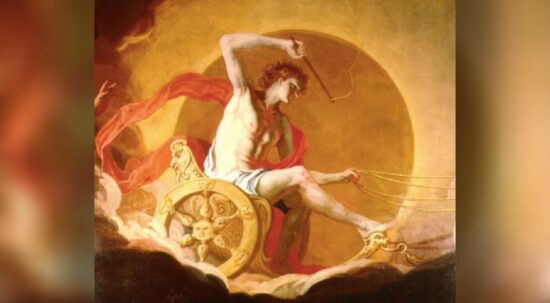
The Enlightenment’s explanation of man’s behavior in terms of human Reason merely repackages this Mystery School lie in intellectual-sounding jargon, once again reducing sin to something man can overcome through behavior modification. Edwards recognized man’s futility as a fallen creature, but infused Enlightenment Reasoning into the simple Gospel message.
…what fellowship has light with darkness? (2 Cor 6:14)
…If then the light in you is darkness, how great is the darkness! (Matt 6:23)
The Judaizers added Old Testament Law or legalistic practices to the Gospel, making Obedience a prerequisite for salvation rather than its fruit. But returning to the Law as a system for righteousness is just another form of man looking to his own abilities to answer his fallen state.
Likewise, the Enlightenment replaced salvation with self-improvement (Humanism/Piety), activism, and intellectual progress as the paths to righteousness, once again making salvation a human achievement rather than the finished work of Christ.
The common root is SIN, rightly understood as the futile attempt to achieve righteousness apart from true Life from God.
We see the result of this blending in modern Christianity. Most Protestant denominations rightly teach that man is incapable of earning eternal life through his own effort, but then they add legalism or Enlightenment thought to that truth:
Legalism; by turning around and telling Spirit-Born Christians to return to the law by following the Ten Commandments—tragically, many even teach that if Christians break them badly enough or don’t repent enough they will lose their salvation, or were never saved to begin with.
Enlightenment ideals; by promoting moralism, theological intellectualism, social justice and progress—again making faith about man’s achievement rather than new birth through the finished work of Christ.
But again, the Law was never meant to save—it was given to reveal sin and point to Christ (Gal 3:24). Christ came to do what man could never do, fulfill the Law, His Holy Spirit writing it upon our hearts (Jer 31:33).
Paul argued against the idea of sin merely being bad behavior.
“Everything is permissible,” but not everything is beneficial. “Everything is permissible,” but not everything is edifying. (1 Cor 10:23)
This faulty understanding of sin shows up in our Bible translations. Here look:
This was to show God’s righteousness, because in his divine forbearance he had passed over*former sins* [G265]. (Rom 3:25 ESV)
(*Modern translations of G265 in the plural leads to misunderstanding sin essentially being bad moral behavior:
G265
ἁμάρτημα
hamartēma
ham-ar’-tay-mah
From G264; a sin (properly concrete): – sin.)
Edwards aim was Piety, but nowhere in his infamous sermon does He speak of God’s great Love for the lost world.
For God so loved the world, that he gave his only Son, that whoever believes in him should not perish but have eternal life.. (Jn 3:16)
Piety, was the furthest thing from the minds of the early Christians! The salvation they’d experienced was so profound that they faced persecution for their faith with joy and singing! This as recorded in Eusebius’ Ecclesiastical History: Complete and Unabridged.
“We… have observed large crowds in one day; some suffering decapitation, others torture by fire; so that the murderous sword was blunted, and becoming weak, was broken, and the very executioners grew weary and relieved each other. And we beheld the most wonderful ardor, and the truly divine energy and zeal of those who believed in the Christ of God. For as soon as sentence was pronounced against the first, one after another rushed to the judgment seat, and confessed themselves Christians. And regarding with indifference the terrible things and the multiform tortures, they declared themselves boldly and undauntedly for the religion of the God of the universe. And they received the final sentence of death with joy and laughter and cheerfulness; so that they sang and offered up hymns and thanksgivings to the God of the universe till their very last breath.” – Eusebius’ Ecclesiastical History: Complete and Unabridged
What a contrast – and what a glaring question this poses about what has happened to Christianity.
Again, Satan tried to subvert God’s Word from day one through the Judaizers, then through the total control over His Word by the RCC. And remember the Jesuit Oath to destroy Protestantism by infiltrating it.
“Among the Reformers, to be a Reformer; among the Huguenots, to be a Huguenot; among the Calvinists, to be a Calvinist; among other Protestants, generally to be a Protestant; and obtaining their confidence, to seek even to preach from their pulpits, and to denounce with all the vehemence in your nature our Holy Religion and the Pope; and even to descend so low as to become a Jew among Jews…” – Jesuit Oath
Other occultists have stated that they plan to destroy Christianity by the same means.
Was Edwards Part of this Plan? Was He a Secret Society Member, a Freemason?
There’s no direct evidence that Edwards was a Freemason, but a connection is still likely because of his family associations and the positions he was able to attain. His wife was the daughter of James Pierpont, a founder of Yale College, Edwards himself becoming president of Princeton University toward the end of his life. His youngest son, Pierpont Edwards received “Masonic light” in Hiram Lodge No. 1 and served as “Worshipful Master” of the lodge from 1777-1778. Edwards also makes several references in his writings to the “architect of the universe.”(Heidelblog.net)
OK, all of the above is plenty of reason to close the book on Edwards. But wait! There’s more!
Because his New Light was based on emotions and reason, “Jonathan Edwards drew on the religious experience of women—HIS WIFE included—as models of God’s engagement of the affections.” (Source) George Whitefield is recorded as saying of the two of them, “A sweeter couple I have not yet seen.”
Sarah Pierpont Edwards
Jonathan Edward’s wife and partner in his ministry, Sarah Pierpont Edwards, was a MYSTIC. Following are excerpts from the Wikipedia article about her.
“[Edward’s wife’s] experiences, similar to those of Saint Teresa of Ávila[<-!], profoundly affected his religious life and the formation of the New Light. She was a model of spirituality during the Great Awakening of the early 18th century. [REALLY!] Her experiences of Religious Ecstasy were documented in Jonathan Edwards’s work, Some Thoughts Concerning the Present Revival of Religion in New England.”
Beginning in late January 1742, Sarah fell into a depression or what may have been a nervous breakdown… She became deeply distressed, and her personality changed dramatically. She became impatient and needful, and she experienced spells of jabbering, fainting, and hallucinating….
She went from feeling the piercing wrath of God for her sinfulness and then transformed in light and love. She then began to have profound spiritual experiences, called religious ecstasy, over nine days… For uninterrupted hours at a time, she felt, in her own words,
‘[I]nfinite beauty and amiableness of Christ’s person, and the heavenly sweetness of his transcendent love; so that the soul remained in a kind of heavenly Elysium, and did as it were swim in the rays of God’s love, like a mote swimming in the beams of the sun, or beams of his light that come in at a window; and the heart was swallowed up in a kind of glow…’
Overcome by these experiences, she had physical reactions including the loss of the ability to speak or stand, fainting, leaping for joy, or other physical reactions. She became committed to fighting sinfulness and to feel the intense spiritual awareness…” – Wikipedia, Sarah Edwards (mystic)
Sounds vaguely familiar, doesn’t it?

“Jonathan … considered her to be the “MODEL OF A TRULY SPIRIT-FILLED PERSON.” He asked her to write down her experiences, which he edited for a work called Some Thoughts Concerning the Present Revival of Religion in New England…
In the July 2021 issue of the William and Mary Quarterly, historians Kenneth P. Minkema, Catherine A. Brekus, and Harry S. Stout published a newly discovered early version of Sarah Pierpont Edwards’s “Experiences” that provided a far more graphic account of her “bodily agitations” than appeared in the accounts published by Jonathan Edwards and, later, by Sereno Dwight, suggesting that both Jonathan Edwards and Dwight were deeply concerned about the vividness of Sarah Edwards’s original account, which they suppressed from the sanitized versions they offered to the public.” – ibid
Um…
If Sarah Edwards was the “model of a truly Spirit-filled person” why would the “more graphic” version of her experiences be suppressed?
Also in Edwards’ own “Distinguishing Marks of the Spirit of God,” he rightly lists some of these “more graphic experiences” as “Negative Signs;’ or, ‘What are no signs by which we are to judge of a work’–and especially, ‘What are no evidences that a work is not from the Spirit of God.‘”
The website TruthSpeaker.wordpress.com sheds some light,
“Several historians… have examined [the wife of Jonathan Edwards’] extraordinary, sometimes turbulent, relationship with her husband and her mystical experiences. Only since the 1980s have critics examined Edwards’s own writings, and then usually only to compare her narrative to her husband’s version of her experiences. These scholars have noted how her husband used her experiences for his own purposes and edited the feminine voice out of her text [and] have discussed how Edwards used her husband’s theology in her descriptions…” – TruthSpeaker.wordpress.com
Again, we’re looking for traces of three things among the Revivalists:
- The Counter-Reformation—The Roman Catholic Church’s (RCC’s) infiltration of Protestantism to bring the Reformers back under “Mother Rome” as spelled out in the Jesuit Oath.
- Enlightenment Thought—which is Greek Thought—which is Mystery School thought.
- Their Secret Society membership and/or association.
Together, Jonathan Edwards and his wife represent the blending of Christianity with both Enlightenment thought and Mysticism.
Given the ready availability of this information, the widespread support for Edwards amongst influential Christian leaders is disheartening. I had to read and re-read Welsh pastor and theologian Dr. D Martyn Lloyd-Jones’ words.
“No man is more relevant to the present condition of Christianity than Jonathan Edwards. [He has that much right, but…] None is more needed.” – Martin Lloyd-Jones, The Puritans: Their Origins and Successors (Banner of Truth, 1987, p. 367)
Lloyd-Jones repeatedly esteems Edward’s knowledge of the Psychology of human nature, even mentioning Edward’s wife “levitating” at a meeting.
“He had to defend a number of unusual and remarkable phenomena that occurred in the revival of the 1740’S. He had to defend, and does defend, the fact that even the body may be affected. Edwards’ wife, on one occasion, exhibited the phenomenon which is known as LEVITATION. She was literally carried from one part of the room to another without making any effort or exertion herself. Sometimes people would swoon and become unconscious in meetings. Edwards did not teach that such phenomena were of the devil…” – ibid
OK, Edwards didn’t think it was demonic and neither does Lloyd-Jones. So it must be alright.
I couldn’t find a primary source for Sarah Edwards levitating and suspect Lloyd-Jones may have concluded that from account of feeling like she was “floating in divine light.” He does mention some of the extreme emotionalism amidst his Revivals, but continues to endorse him,
“…But, of course, his one interest was the glory of God and the benefit of the church.” – ibid
I mean no disrespect to Martyn Lloyd-Jones and I sincerely hope this was merely the influence of his enlightenment-thought infused seminary education that championed Edwards. But even at that, it’s hard to believe he could miss something this big. Isn’t that a prime example of how most Christians think though? Rather than getting to the bottom of something that puts a check in their spirit they accept the opinion of an established spiritual authority figure.
“Well, brother Joe-Bob says so. That’s all I need to know!”
A Little Side Note About Levitation
There are Buddhist, Gnostic, Hellenist and Hindu accounts of Levitation. And Wikipedia offers supposed examples of Christians levitating. But the only scriptural thing they mention is Jesus walking on the water. The other things listed are either Catholic or Demonic.

Then there’s the account of “Christian” (Catholic) St. Thomas Aquinas levitating. An article titled “Jesus speaks to Saint Thomas Aquinas from the Crucifix” on the website Catholic365 states,
“He looked up at the crucifix. It began to glow brightly. Jesus came alive and spoke to Thomas… He was told ‘You have written well of Me, Thomas. What would you desire as a reward?’ Thomas broke into tears, as he replied, ‘Nothing, Lord. I’m doing it all for you.’ At this point, St. Thomas Aquinas went into Ecstasy, and LEVITATED. His entire body FLOATED into the air and hovered over the chapel. All the brothers in the convent came into the chapel where he was praying and beheld him suspended in the air.” – Catholic365
Aaand, the 2022 article on veterumsapientia.org records the Pope calling for the restoration of the “wisdom” of St. Thomas,
“[T]he Pope exhorts the bishops of the world “to restore the golden wisdom of St. Thomas, and to spread it far and wide for the defense and beauty of the Catholic faith, for the good of society, and for the advantage of all the sciences.” – veterumsapientia.org
Again, the Counter-Reformation never ended. And again; Catholicism is a Mystery School Religion that it encompasses Gnostic Mysticism and Kabbalah—which are witchcraft.
Finally: About All Those Conversions
No different than today, there was a problem with the church-goers of Edward’s time lacking zeal for the gospel, but that is not from a lack of fearing hell. It’s the lack of a genuine conversion resulting from having heard and received another gospel.
If Edwards’ preaching reflected his supposed ‘psychological expertise,’ the results seem questionable. While his sermons reportedly produced ‘thousands of converts,’ there’s no evidence of an increase in church membership in his day. Their membership requirements being more strict, that would suggest that any of these transformations were likely short-lived.
Right from the earliest days of Protestantism, we see these “Revivals” trading the simple preaching of the Gospel of Grace for an Enlightened, Psychological manipulation to stir man to better himself, which is Mystery School/Enlightenment thought in a nutshell.
The more I dig, the clearer it becomes that the so-called ‘Great Awakenings,’ their ‘Revivals,’ and the celebrated ‘pillars’ of American Christendom played a pivotal role in subtly reshaping the Gospel, diminishing its powerful truth.
Yet because of false brothers secretly brought in—who slipped in to spy out our freedom that we have in Christ Jesus, so that they might bring us into slavery— to them we did not yield in submission even for a moment, so that the truth of the gospel might be preserved for you. (Gal 2:4-5)
In a world full of ‘Truth evangelists,’ the only truth that matters is THE GOSPEL OF JESUS CHRIST. Of all the poisonings—through injections, food, air, or water—the only one with eternal consequences is the poisoning of the Gospel of Grace.
Once we leave this world it won’t matter if they’ve switched to digital currency, poisoned us, or engineered chaos. Our eternity isn’t tied to making America ‘great’ again or exposing pedophilia, although we should be wise about these things.
See then that ye walk circumspectly, not as fools, but as wise, Redeeming the time, because the days are evil. (Eph 5:15-16)
There’s no evidence to support the lie that we’ll float off into some vague singular “oneness” after we die. But there is abundant proof that Jesus Christ rose bodily from the grave and was witnessed by over 500 people. Our eternity depends entirely on hearing and responding to Him—the Word of Truth, His Gospel of Grace—and receiving the Spiritual Birth He offers to those who believe.
Jesus said to her, ‘I am the resurrection and the life. Those who believe in me, even though they die, will live.’ (Jn 11:25)
Hold tightly to His truth brothers and sisters. The days are evil.
Next up is John Wesley!
God bless and Stay Watchful! ! (Col 4:2)
Revivals Pt1 – Asbury: Let’s Talk About Revivals
Revivals Pt2 – Enlightenment in the Land of the Plumed Serpent
Revivals Pt3 – Mystery Schools, The RCC and the Reformation
Revivals Pt4 – The First Great Awakening & The Enigmatic George Whitefield
Revivals Pt5 – The Brimstone and Mysticism of Jonathan Edwards
Revivals Pt 6 – John Wesley (1 of 2) – The Mystery School Dialectic and Christian Mysticism
Revivals Pt 7 – John Wesley (2 of 2) More Mystics & Papal Doctrines of Men
Revivals Pt8 – From Wesley to Finney By Way of Count Zinzendorf
Revivals Pt9 – Charles Grandison Finney, Freemasonic Moralism and Modern Evangelicalism
Revivals Pt10 – The Pagan “Virus“
Revivals Pt11 – The Third Great Awakening: Pentecostalism!
Revivals Pt12 – Pentecostalism Pt2: The Founders of Pentecostalism
Revivals Pt 13 – Social Justice Pt 1 – They Don’t Mix
Revivals Pt 14 – Social Justice Pt 2 – A City Upon A Hill
Revivals Pt 15 – Christ in You vs Millennialism
Revivals Pt 16 – The Counterfeit Enlightenment Pt 1
Revivals Pt 17 – The Counterfeit “Enlightenment” Pt2: The Dark Ages and Golden Age of Islam
Revivals Pt 18 – The Counterfeit “Enlightenment” Pt 3: Islam In the Bible?
Revivals Pt 20 – The Counterfeit “Enlightenment” Pt5: Placing Man Upon An Esoteric Sphere
Revivals Pt21 – The Counterfeit “Enlightenment” Pt6: The Image of the Beast
Revivals Pt22 – Crowning the Lord of the Earth: The Cosmati Pavement
Revivals Pt24 – The Great American Mythos Pt2: A Whole New Mystically Enlightened World
Revivals Pt25 – Creating the American Mythos – Christopher Columbus: The Great American Hero Pt1
Revivals Pt 26 – Christopher Columbus Pt 2 – The Namesake Goddess of a “Christian” Nation
Revivals Pt27 – The Witchcraft of Numbers
Revivals Conclusion Pt2 – What Is The Gospel?
Revivals Conclusion Pt3 – Subversion – From Revivalists to Modern Times



